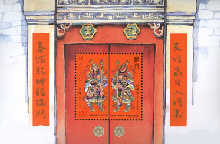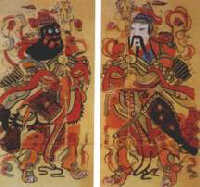| Chinese Way > Daily Highlight |
|
|
Lord of the Door
The custom of pasting prints of door gods was common almost everywhere in China during the Chinese New Year (the Spring Festival ) to ensure safety for the family. Nowadays, some places in rural China still subscribe to the custom. In recent years, more and more scholars have intensified their research and study of the Chinese door god culture, making people increasingly aware of its significance.
In the vast ocean lay the land of Tusu, with a large peach tree, whose foliage extended over 3,000 miles. The northeastern side of its branches made up the Gate of Specters, where a myriad of specters passed. On the land were two divine men, Shentu and Yulei, who directed the examination and management of the host of specters. Evil specters were fettered with reeds to be used as food for tigers . The Yellow Emperor then instituted a ceremony to drive off specters during particular seasons: He set up large images of peach wood painted by Shentu and Yulei on gates and doors, and, with a tiger, suspended there reeds to repulse them.
|
|||||||
 |

 Origin of door gods
Origin of door gods
